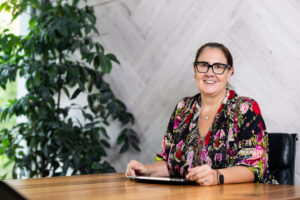Sustainability: A construction career: Jayne Whitney
Setting the scene
At the start of 2024, Australia’s public infrastructure workforce was around 229,000 people short of what was needed to complete the pipeline of projects, according to Infrastructure Australia.
Without improving gender diversity, the infrastructure sector – an industry that employs around 10% of the nation’s workforce – is unable to draw from talent pool of half the population.
At the same time, around 70% of Australia’s emissions are enabled by infrastructure. Both diversity and sustainability are big problems to solve – and Jayne Whitney has spent her career solving big problems.
This series, developed by the Infrastructure Sustainability Council with the support of the NSW Government, spotlights stories of female sustainability leadership. By sharing stories that lay bare the obstacles and outline the opportunities, we hope to give more Australian construction businesses the insights and impetus to grow their workforce of female sustainability specialists.

Capturing hearts and minds
As Chief Strategy Officer at John Holland, Jayne has amassed some impressive achievements: driving a growth strategy that has helped grow the business, leading successful acquisitions and championing an ambitious digital transformation program.
 Jayne is also a Non-Executive Director of the Australian Contractors Association, the Chair of the ACA Culture Committee, a member of the Culture in Construction Taskforce, and a member of Chief Executive Women. Jayne also served two terms on the board of the Infrastructure Sustainability Council.
Jayne is also a Non-Executive Director of the Australian Contractors Association, the Chair of the ACA Culture Committee, a member of the Culture in Construction Taskforce, and a member of Chief Executive Women. Jayne also served two terms on the board of the Infrastructure Sustainability Council.
Jayne’s career has been characterised by a series of ‘pivots’ that turned her towards sustainability slowly but surely.
With a head for numbers, Jayne’s teachers steered her toward a mathematically-based degree, and she completed a Bachelor of Economics with honours “without a clear idea of where this would take me”.
“I knew I didn’t want to be an economist. I really loved studying the subject, but I wasn’t motivated to pursue economics as a career,” Jayne reflects.
During her university holidays, Jayne worked for an engineering business that was expanding into America. On graduating, she put her hand up for a role in the United States. “They agreed, despite there being no particular role for me, and that is how I kicked off my career, initially writing computer programs.” A pivot towards marketing was her next step, and Jayne’s career progressed to roles in strategy and business development.
After completing a master’s degree in international business, Jayne moved to Australia in 1996. She took up a role with Transfield Services and found she loved the infrastructure sector. Roles with AGL Energy, Tenix, UGL and John Holland followed.
While at Tenix Jayne’s talent for problem solving aligned with the great sustainability conundrum. “My CEO at the time was very progressive, and knew we needed to be thinking about sustainability in infrastructure. He could see a gap in our organisation and wanted me to jump into it and work through our approach and how we could lead the industry on sustainable solutions.”
With infrastructure responsible for an “enormous” emissions footprint, Jayne’s mind turned towards the then “embryonic” Infrastructure Sustainability Council. “I recognised the role of the Council as potentially the most impactful mechanism to drive sustainability in the infrastructure industry, and wanted to be part of developing an independent rating tool. As such we committed ourselves to actively supporting the Council and joining the Board”
Solving the sustainability gap
In 2020, the Infrastructure Sustainability Council undertook research that confirmed the IS rating tool’s return on investment is a minimum of $1.60 for every dollar spent – and this figure could be as high as $2.40. This is over and above the productivity dividend.
But when Jayne joined the ISC board in 2011, the business case for sustainable infrastructure was far from settled.
Jayne was involved in the IS rating tool’s development, and Tenix was the first company to commit to applying the sustainability benchmarks on the $45 million Whitsunday Sewage Treatment Plant Upgrade project, two assets at Proserpine and Cannonvale in north Queensland.
“This was at a time when the general narrative was ‘sustainability costs money; it will make you uncompetitive’. People were yet to understand how sustainability was good for business, good for communities,” Jayne says.
 “When we pursued that first rating, I was really clear with the team that we could spend no more money than we would on any other project. It had to be a cost neutral business case, at the very least.”
“When we pursued that first rating, I was really clear with the team that we could spend no more money than we would on any other project. It had to be a cost neutral business case, at the very least.”
Translating the theory of sustainable infrastructure and a series of spreadsheets into a real live application was not easy, but the results remain remarkable to this day. Optimising the design cut 1,500 tonnes of carbon emissions, and a further 21,000 tonnes will be eliminated over the lifetime of the two assets, thanks to clever energy reduction strategies.
The project delivered a 43% total life cycle water saving – representing around three gigalitres – from more efficient use of recycled effluent. And a strong commitment to sustainable procurement was achieved, with 61% of the total budget spent in the Whitsunday region.
“We had a project leader who was incredibly passionate and motivated, and he showed other project managers it could be done. The pivot point for us was showing that it would deliver a net benefit without costing more.”
Whitsunday Sewage Treatment Plant Upgrade project was subsequently awarded the first IS Design rating in 2013. This was a “milestone” not only for Tenix, but for Jayne. “This was a pivotal moment for me, as a champion of sustainability, but also to see the project managers open their arms to the possibilities.”
Action and acceleration
Jayne’s background in economics proved invaluable when selling the business case for sustainability, and her strengths in marketing gave her message additional firepower. “I recognised that I could bring the two together – sustainability and commercial outcomes – to create compelling conversations.”
Jayne is now using those same skills to champion the Culture Standard,built on the pillars of wellbeing, time for life, and diversity and inclusion. She is committed to bringing this Standard to life within the ACA Culture Pledge, through flexibility, embedded cultural change, and attracting more women into the infrastructure industry.
“We know the issues we need to solve. Our challenge is shifting the thinking and ways of doing things that have been entrenched for more than 100 years. The critical success factor is being able to bring together the environmental, social, and capability drivers, with the commercial ones.”
Lessons learnt
- Encourage mentors and sponsors to step up: Both male and female mentors play an important role in nurturing female talent. Some of Jayne’s most important career moves were made because male leaders backed her, and created an environment for success, but also to ‘fail safely’ and learn. As Jayne notes: “I think I’ve had an easier journey over the course of my career because I’ve had great leaders, sponsors and mentors.”
- Foster the right connections to turn ripples into waves: Several “amazing” women have played their part in furthering Jayne’s career by showing her “the enormous potential to make changes” in the infrastructure space. One of those is Romilly Madew, the current CEO of Engineers Australia, and former CEO of the Green Building Council of Australia and Infrastructure Australia. “Romilly is a contagious force of nature. She took me on the journey with the Green Building Council of Australia and showed me what might be possible for infrastructure.”
- Cast a wide net for talent: Jayne’s educational and career background are evidence that sustainability leadership is waiting in unusual places. Her early years were spent in marketing, business development and human resources roles. But these positions laid the foundation for a formidable skill set that adds value to the sustainability conversation from multiple angles.
Jayne Whitney, John Holland


